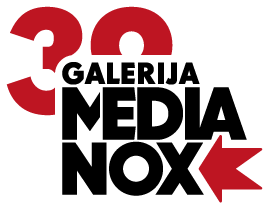Galerija Media Nox v sklopu umetniške rezidence umetnice in fotografinjeEva Sajovic, ki prihaja iz Londona, vabi na učni laboratorij -->
Learning Lab: UNLEARNING THE ROLE OF THE ARTIST / Part 2
ki se bo kot celodnevni dogodek odvil v četrtek, 13. 7., med 10. in 17. uro v prostorih galerije.
Dogodek je brezplačen, število mest je omejeno, zato je nujna predhodna prijava do 8. 7. na media.nox@mkc.si
Learning Lab bo izpostavil vlogo fotografije v sodobnem času - predvsem skozi problematiko migracij, vendar na nekoliko drugačen način - skozi ekološko-sociološki vidik:
// FOTOGRAFIJA KOT ORODJE AGENCIJ IN EMANCIPACIJE // je osrednja tema dotičnega Learning Lab-a / part 2.
Udeleženci se boste posvetili prespraševanju vloge fotografije v sodobnem času, ko jo v veliki meri diktirajo agencije. Je lahko fotografija orodje emancipacije? Kakšna je njena družbena vloga danes?
Ker se umetnica Eva Sajovic ukvarja z ekološko-sociološkim vidikom migracij, bo na Learning Lab-u izpostavljeno tudi vprašanje klimatskih sprememb, ki tako ali drugače vplivajo na migriranje.
SODELUJOČI STE VABLJENI, DA S SEBOJ PRINESETE FOTOGRAFIJE z motivi ljudi/krajine, ki so tako ali drugače povezane z vidiki migracij, klimatskih sprememb in podobnih tematik.
// KAJ JE t.i. LEARNING LAB? //
Učni laboratorij oz. Learning Lab je konstruktivna oblika sodelovanja med kulturniki, aktivisti, predstavniki civilne družbe, raziskovalci, oblikovalci politik ... skozi dialog, ki premika meje uveljavljenega. Udeleženci iščejo odgovore na splošna vprašanja perečih družbenih vprašanj, pri čemer je še posebej v ospredju tema migracij.
Learning Lab (učni laboratorij) je participatorna oblika diseminacije znanja in raziskovalni proces obenem. Je praktična delavnica, dogodek, panela, okrogla miza, projekcija ali pogovor.
Learning Lab bo potekal v ANGLEŠKEM JEZIKU.
Gostji Learning Laba bosta ob umetnici Evi Sajovic še Agnes Czajka (Open University) ter Áine O’Brien (Counterpoints Arts). Projekt je nastal v koprodukciji s Terra Vera (SLO) in je bil prvič realiziran v Tate Exchange London.
// SODELUJOČI MENTORJI LEARNING LAB-A //
EVA SAJOVIC is a Slovene born artist photographer, living and working in London. She is an Associate Lecturer at UAL’s Central Saint Martins and Theory Lecturer at Chelsea College of Art. Her focus is on socially engaged, participatory practice through which she explores the drivers ofglobal displacement such as regeneration, poverty, trafficking, culture andclimate change. Her practice covers twostrands Participatory social action projects and Photographicsocial portraiture. http://www.evasajovic.co.uk/about
ÁINE O’BRIEN is Co-Founder and Co-Director of Counterpoints Arts, London. She created FOMACS (Forum on Migration and Communications) in 2007 developing creative arts and public projects focusing on migration, including Moving Worlds and Learning Lab. Áine co-founded Centre for Transcultural Research and Media Practice (2005) aligning migration research with creative arts. She serves on the Advisory Board for Centre for Cultural Studies Research, UEL and her productions to date (across documentary film, print, exhibition and curation) explore global storylines linking migration with social justice. Áine is creative producer of a cross-sector participatory arts and design project on everyday integration, ‘Everyday on Canalside’ and the film and social action programme, ‘Out of Place’.
AGNES CZAJKA joined the Department of Politics and International Studies in 2013. Prior to joining the Open University she taught politics at Sabanci University in Turkey, and sociology at the American University in Cairo and the University College Cork in Ireland. Agnes received her M.A. in Political Economy from Carleton University in Ottawa, and her Ph.D. in Sociology from York University in Toronto.
// ORGANIZATORJI IN SOORGANIZATORJI //
Eva Sajovic, Counterpoints Arts, Terra Vera, Galerija Media Nox
Dogodek je del projekta strateškega partnerstva Craft Flow: Refugee Empowerment through Craft & Entrepreneurship, ki je delno financiran s strani programa Erasmus+ in Zavoda Movit.
INFO / ENG -->
This Learning Lab, Unlearning the Role of the Artist: Part 2, is framed by the interdisciplinary methodologies and comparative arts practice of London-based artist, Eva Sajovic.
Learning Lab builds upon an ongoing, collaborative conversation between artist, Eva Sajovic, Agnes Czajka (Open University) and Áine O’Brien (Counterpoints Arts) initiated at the Who Are We? project at Tate Exchange London. It is co-produced with Terra Vera, Slovenia.
Prior to the launch of Eva’s exhibition in the Media Nox Gallery, Learning Lab invites artists, curators, activists, educators and interested practitioners to partake in a day of critical debate and co-production.This will include critical panels, co-production workshops, and the preparing of food and eating together.
Eva’s work pushes the boundaries of participatory and collaborative arts, challenging the dynamics of power and assumptions made by artists when working with and alongside communities of place and dis/placement. Her participatory photography and social portraiture to date will guide our conversation, specifically focusing on work produced during a recent two-part residency on climate change and displacement at Darat Al Funun Foundation in Amman, Jordan.
Learning Lab will facilitate critical dialogue and a questioning of participatory photography as a tool of agency and emancipation.We will also explore how different types and practices of citizenship can be enacted through photographic practice, and how natural plants and ecology act as catalysts for new modes of citizenship and community.
We aim to convene a co-production workshop and invite participants to bring photographs of plants and people relating to issues of migration, climate change, and displacement. Our aim is to layer the photographs with aural
and written statements collated through our conversations and to transform and/or re-contextualise the images to
communicate a collectively forged/defined narrative.
This methodology is based on the model of the tape slides medium, largely used by community photography groups in the UK in the 70s, as a means of creating alternative modes of communication.

